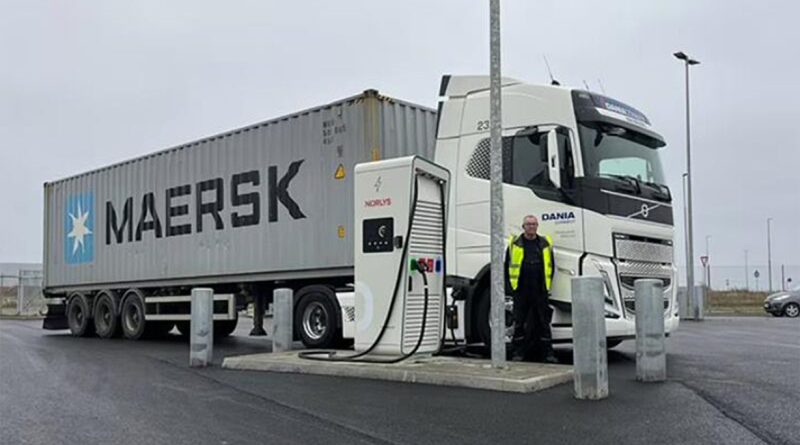Maersk and Grundfos Drive Sustainability with Electric Trucks in Europe
The logistics industry is undergoing a major transformation as companies seek ways to reduce their carbon footprint. Freight transportation contributes significantly to global greenhouse gas emissions, making sustainability efforts in this sector crucial. Among the most promising solutions is the adoption of electric trucks, a shift that could revolutionize road freight while significantly lowering emissions.
Maersk is leading this transition by expanding its electric truck fleet in Europe. Through a strategic partnership with Grundfos, a global leader in pump manufacturing, Maersk is taking meaningful steps toward decarbonizing logistics operations.
A strategic partnership for green freight
Maersk’s sustainability journey has been marked by key initiatives, including its commitment to achieving net-zero emissions by 2040. The company has invested in low-carbon shipping fuels and carbon-neutral transportation alternatives to help customers transition to greener supply chains. Grundfos, a Danish company known for its commitment to environmental responsibility, has already taken steps to decarbonize its logistics, making it an ideal partner for this initiative.
Since October 2024, an electric truck has been transporting goods between Grundfos’ factory in Denmark and the Port of Aarhus. This pilot program aims to replace conventional diesel trucks and is expected to scale up, handling between 600 and 800 containers annually. The truck is powered exclusively by renewable electricity, eliminating direct tailpipe emissions and significantly reducing the carbon footprint of these transport operations.
Grundfos has long prioritized sustainable logistics. Since 2020, it has used Maersk’s ECO Delivery Ocean product, which relies on alternative marine fuels such as waste-based biodiesel and bio-methanol, cutting emissions by up to 80% compared to traditional fossil fuels. This new electric truck initiative represents the next step in its decarbonization strategy—addressing emissions in inland freight transport.
The impact of electric trucks on logistics emissions
The deployment of electric trucks is a major milestone in sustainable freight transport. Traditional road freight is responsible for a large share of global carbon emissions, making the shift to electric vehicles an effective way to reduce logistics-related emissions.
However, the widespread adoption of electric trucks presents challenges. High vehicle costs, limited driving range, and insufficient charging infrastructure have slowed the transition for many logistics firms.
Maersk’s long-term sustainability vision
The electric truck partnership between Maersk and Grundfos is part of a larger strategy to reduce emissions across the supply chain. Maersk has set a target of reaching net-zero emissions by 2040, with interim goals to significantly cut carbon output by 2030. This includes reducing emissions across its shipping fleet, warehouses, and inland transportation.
A key element of Maersk’s sustainability plan is its investment in alternative energy sources. The company has been leading efforts to decarbonize maritime logistics through biofuels, green methanol, and other clean energy solutions. Now, with electric trucking gaining momentum, Maersk is expanding its focus beyond ocean freight to include zero-emission land transport.
This initiative with Grundfos is expected to pave the way for further deployment of electric trucks across Europe. Maersk is actively exploring additional partnerships and new routes that could benefit from electric freight solutions. By expanding its electric truck network, the company aims to create a scalable model that other logistics firms can follow.
For Grundfos, this collaboration aligns with its broader commitment to sustainability. The company has pledged to achieve net-zero emissions by 2050, with significant reductions planned by 2030. By integrating zero-emission trucking into its supply chain, Grundfos is demonstrating how manufacturers can actively reduce transportation-related emissions.
A model for the future of freight
The Maersk-Grundfos partnership offers valuable insights into how businesses can transition to greener logistics. As regulatory pressures increase and customers demand greater sustainability efforts, more companies will need to explore electric trucking and other low-carbon transport options.
One of the biggest challenges in scaling electric trucking is infrastructure. Unlike diesel-powered vehicles, electric trucks require an extensive charging network to support long-haul routes. Investments in fast-charging stations, renewable energy grids, and battery technology will be crucial in making electric freight a widespread reality.
Government policies also play a critical role in this transition. Incentives for electric vehicle adoption, infrastructure development, and carbon pricing mechanisms can accelerate the shift to sustainable logistics. The Maersk-Grundfos initiative serves as a real-world example of how industry leaders can drive change and encourage broader adoption of clean transportation technologies.
The expansion of electric trucks in Europe is a crucial step toward a cleaner and more sustainable logistics industry. Maersk and Grundfos are proving that large-scale emission reductions in freight transport are achievable through strategic collaboration and investment in green technology. As this initiative grows, it will serve as a benchmark for other companies looking to transition to zero-emission logistics. While challenges remain in infrastructure, costs, and scalability, the momentum behind electric freight transport is undeniable.
Sources:
To keep up-to-date with our latest transportation and logistics news, subscribe to our newsletter today.
